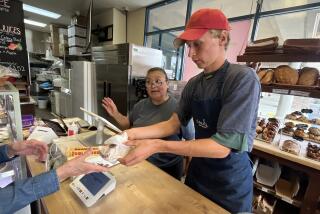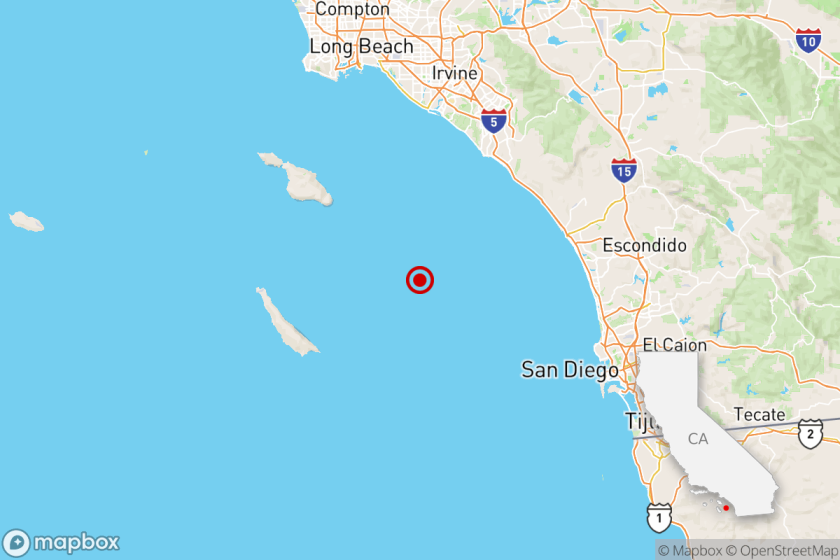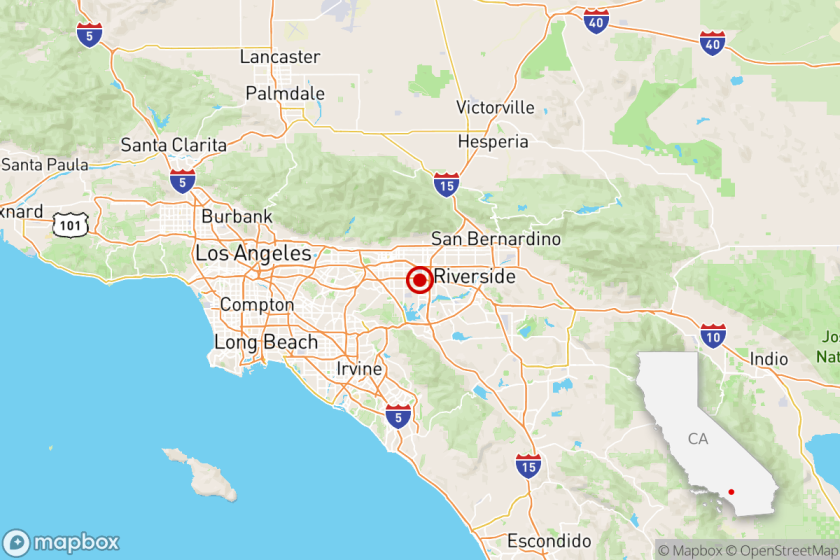The Golden State of DENIAL : Disasters: How do many Californians prepare for a quake? By tuning out their fears. Experts call it a normal, primitive reaction to a crisis--that can be taken to unhealthy extremes.
Dennis Persons is a second-generation Californian who lives nearly atop the San Andreas Fault in Palmdale. He’s also a fu neral director who, in the 1980s, worked on an area earthquake contingency plan to deal with up to 10,000 bodies in the event of the Big One.
But when last week’s magnitude 6.6 Northridge quake struck, he still hadn’t stocked up on food, water or flashlights. And still, after determining that he, his wife and his house were OK, his first inclination was to roll over and go back to sleep.
“Like a lot of people, you think you’re going to live forever. You think this happens someplace else,” said Persons, 42. “After it’s over, it goes to the back burner, then you’re not prepared again for the next one.
“I guess it’s some psychological thing.”
Mental health professionals call it denial. It is, they say, a normal if primitive reaction to disaster, and such a constant companion to Californians that it seems part of their very nature.
All healthy organisms use denial to some degree as a defense mechanism against trauma, loss or impending catastrophe, said Dr. Kirk Murphy, a psychiatrist with UCLA’s Neuropsychiatric Institute and Hospital. As a coping mechanism, denial is less sophisticated than sublimation (losing ourselves in work or hobbies) and more internal than, say, consuming alcohol, but works in the same way to numb intolerable feelings of helplessness.
“Everyone lives in a state of denial. It’s necessary in order to enjoy life. We’d all be walking around barely functional if we thought about all the horrible things that could happen to us,” said Encino psychologist Martha Widawer.
But how much denial is too much?
Audrey Riggs, 70, of Westchester, said she doesn’t like to think about earthquakes. “I’m afraid,” said Riggs, who has lived in California since 1945. When the temblor hit, she was “totally unprepared.”
Excessive denial, of course, can be fatal to individuals who insist on remaining in harm’s way--such as the man next to Mt. St. Helens who refused to vacate his home despite warnings of an imminent eruption. And it can be costly to society if leaders put off thinking about how to build safer buildings and bridges once the immediate crisis passes.
After a decade of official statewide earthquake preparedness programs, Californians appear to have become increasingly realistic about earthquakes. Disaster researchers said the state is better prepared in building codes, land surveys and awareness programs than such places as Manhattan and Missouri, which also sit atop earthquake faults. Still, most Californians haven’t fully prepared for one.
According to a 1993 UCLA study, many people in Los Angeles County and the San Francisco Bay area have done the “easy things”--stocking up on flashlights, radios, food, water and first aid kits.
But very few have done the “hard things,” such as creating a family earthquake plan or bolting down their homes. Only one-fifth had prepared for earthquakes at work. Only about 15% had purchased earthquake insurance. A handful, 4%, knew of a neighborhood earthquake plan.
More than twice the proportion of Northern Californians (16%) had structurally reinforced their homes as Southern Californians (6%). Fewer than 15% in both regions had secured their furniture and less than 10% had installed cupboard latches.
Although preparedness rates are generally up from 11% after the 1971 Sylmar quake, UCLA sociology researcher Linda Bourque said: “I’m not sure I can say the denial levels have gone down.”
*
No one knows, for instance, how many people are like Burbank real estate broker Gary Claussen, 53, who put an earthquake survival kit in his car seven years ago but never touched it again until last week. “The batteries were dead. Crackers were smashed (by the) canned goods. The water had leaked out. Threads broke on the zipper. I went to reach for a candle and only felt a string in melted wax. Everything in there had been cooked.”
Claussen doesn’t think he’ll get another kit. “Those things cost about $100,” he said.
One school of thought says Californians are predisposed to denial by their very attraction to a geography with no natural life-sustaining features. Indeed, one woman said that after watching the effects of the disaster on TV, she drove through Manhattan Beach, where people were jogging and walking along the beach as if nothing had interrupted their holiday.
It wasn’t until she heard personal stories from friends closer to the epicenter that she was inspired to prepare for aftershocks by taking pictures off walls and taping cabinets shut.
“We live in a culture of denial,” said Laguna Beach psychologist Ellen McGrath, who has counseled fire survivors. She believes that people must confront their denial and replace it with “calm awareness” of the disaster in order to remain healthy.
In the past, some people have had a stake in perpetuating denial. These were civic boosters who thought widespread fear of earthquakes might hurt business and growth. In their book “Denial of Disaster,” Gladys Hansen and Emmet Condon contend that San Francisco civic leaders tried to minimize the effects of the 1906 earthquake by confirming 500 deaths, rather than the more likely 3,000. The officials also preferred to blame fires for the damage, knowing that people have a greater fear of earthquakes because they are less controllable.
McGrath said that in her experience, more men than women tend to deny disasters, and earthquake supply vendors say more women than men tend to prepare. Researchers said data is scanty, but there is some evidence that shows younger males, particularly college students, don’t prepare at all.
Bill Carey, 21, a senior biology major at UCLA, readily acknowledged that he never takes precautions. His parents sent him earthquake supplies, including a flashlight and batteries, but, he said, “I don’t even know where they are now.”
Even now, he has no plans. “Later on, when I have to be responsible for people other than myself, I’ll probably take care of earthquake safety. Now other things are more important than earthquakes: career, education, graduating.”
*
Researchers found that what works best to jolt Californians out of denial are their own proximity to an epicenter, their own earthquake-related experiences and fear.
It also helps if they have the resources to do something about it. UCLA’s Bourque said the people who tend to prepare before an earthquake are upper middle class with higher rates of income and education.
“Older people are somewhat more likely to prepare at higher rates. They have more money usually, have lived in California longer, and I also feel they are less likely to feel so omnipotent,” she said.
Falling into the opposite extreme, some people have too little denial and overestimate the risks, UCLA’s Murphy said. They include survivors who last week insisted on sleeping outside in parks even though their dwellings were undamaged and the risks of another major quake had subsided.
But it is human nature to overestimate the risk of a current situation and to underestimate the benefits of preparing to avert a potential disaster, he said.
After every earthquake, there is what preparedness officials call a “window of opportunity” during which people are more receptive to hearing about their own vulnerability and the vulnerability of their artificial environment.
Said Bourque: “We always see an increase in activity in that window of opportunity. When you look back, many of the bills to reinforce buildings were passed in the aftermath of an earthquake. The same thing happens with individuals. We see an increase in the easy preparedness activity: storing water, canned goods, non-electric can openers, inquiring about insurance, coming up with plans to handle children.
“But then as time passes, people go back to their normal state.”
*
Roger Rook, 51, an actor from Glendale, said: “You don’t let your head hang on it. Otherwise, you’re walking around paranoid all the time. I just try to put it behind me and go on.”
But Rook is, in fact, fully prepared--not only with water and lanterns, but also a bolted foundation. He was inspired, he said, by information about known faults, becoming more mature and responsible with age, and by the increasing severity of the shocks.
“I remember the ones in the ‘40s and ‘50s; they didn’t seem as powerful as this one. It seems like in the last 20 years, they have gotten heavier, more destructive, more powerful, more violent, more intense.
“This one hit like a bomb.”
Before Monday, Richard Masson, 35, said he was “a little bit of a nonbeliever.” In his Hidden Hills neighborhood, five miles from the epicenter, “no one was prepared,” he said. “There was a good amount of disbelief. It’s an act of God that occurs without warning. It’s a very difficult thing to prepare for in earnest; there’s such a high probability that it will never happen.
“Now I think there are a few simple things you can do to make sure you are somewhat prepared. I’m not going to get into carrying a survival kit with me or pack clothes for three months. But I will make sure I have a flashlight under the bed and shoes” for walking on broken glass.
Luckily, he said, his wife had purchased earthquake survival supplies, which they brought out Monday morning to share with neighbors. “Had we been isolated,” he said, “we would have survived because of it.”
Denial Checklist
Laguna Beach psychologist Ellen McGrath says denial is a natural reaction to disaster, but if ignored, it can prevent people from taking adequate safety precautions or from full emotional recovery. She says you may be experiencing some form of earthquake denial if you have found yourself thinking or saying:
* It happened to them, but it could never happen to me.
* It didn’t happen to me because I’m better/smarter/more religious/etc. than the victims.
* I won’t be intimidated. I can still live on earthquake faults or near open space with chaparral and nothing will happen to me.
* I’m so busy rebuilding, I just don’t have time to whine or cry about what happened.
* I’ve been sick, or I’ve been eating/drinking/spending significantly more, but it has nothing to do with the earthquake.
* I don’t cry and I’m not depressed. What do I have to be depressed about when others are so much worse off than I am?
Psychiatrists and mental health professionals from UCLA’s Neuropsychiatric Institute and Hospital are providing counseling and referrals for quake-related emotional problems from 8 a.m. to 8 p.m. Monday-Friday through a special hot line: (800) 825-9989. Emergency psychiatric services are available 24 hours a day at the same number.
More to Read
Sign up for Essential California
The most important California stories and recommendations in your inbox every morning.
You may occasionally receive promotional content from the Los Angeles Times.










